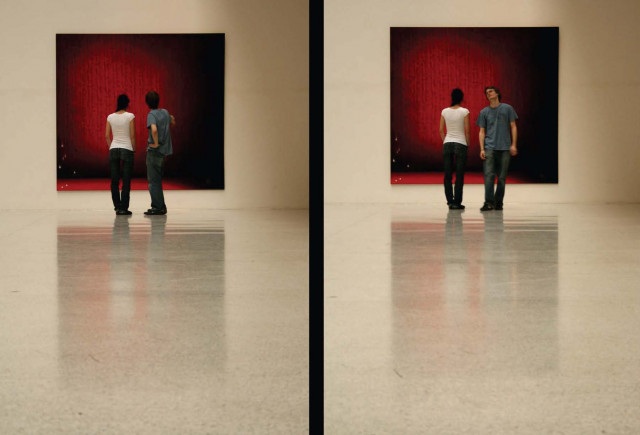Beauty and brains: artists work to inspire change
The 3rd IVS Alumni Collective boasts of works by 41 graduates of the Indus Valley School.

With works by 41 graduates from all departments of the school on display, the exhibition offered something for everyone.
“It has been a year of trials for Pakistan. So many things have happened that test our spirit which, however indomitable, does falter at times,” said the alumni committee in a statement. “And though we do come out of each incident more determined to survive, questions do arise in our mind. Whose Pakistan is it, anyway? Because you are small in number does it mean that you don’t count as part of the country’s identity?”
These were the questions that inspired the theme for this year’s alumni collective, “Mein bhi Pakistan hoon, tum hi Pakistan ho”, which, according to the IVS Alumni Show Committee, aimed to prove that art can inspire change.
“We encouraged our participating artists to create something that inspires someone, that makes someone’s day or makes someone pause a moment and think,” the committee stated.
The evening began with “soundscapes” from artist and musician Talha Asim Wynne and his band “Orangenoise”. For Wynne, “Karachi is a place where resources are limited”, but that does not come in the way of him creating music. The musician used all the resources that were available to him to create “a raw and indie sound” that reflected his “influences” and exhibited his “ability to communicate through music”.
“Architecture is about working on a 3D canvas,” said Ali Asghar Alavi, who used references to architecture and interior spaces to design “a space within a space” in his series of photographs.
Meanwhile, with her series, titled “Now I see you then I don’t”, Amna Iqbal used photography to create a six-frame narrative on people’s take on art while Anam Haleem used digital painting to create “an epic fantasy battle”
“I treat painting as a meditative process and try to find the lyrical verses within,” said Emaan Mahmud, who aimed to capture her past and present in her work in order to “begin a journey of discovery”.
“With’presentation becoming a significant part of how we view the world around us, a superficial veneer that frequently hides more than it reveals often defines situations and individuals,” said Essa Malik, adding, “My work attempts to explore this ever-present feature of our lives and aims to depict the reality behind the apparent.”
Meanwhile, Humayun Memon photographed the ceilings of a Jain temple in his attempt to discover and “share with the world” the places that not too many people get a chance to visit. Khaula Jamil attempted to address some of her concerns regarding the current state of social unrest in Pakistan while Anser Shaukat used references to things that surround him in his everyday life to “challenge common perceptions”.
“Letter by letter, punching fast and punching slow, we initiate some of the most significant constructions and deconstructions of our lives,” said Momin Zafar, who used extracts from two sets of emails to “chronicle the modification of things beautiful”.
Abdul Sattar worked with geometric shapes, textures and organic lines while designing contemporary furniture that placed emphasis on “multiple functionalities”. Abeer Asim translated her experience of living away from home in a series of ceramic pieces layered with images of her passport and news prints while Ahmed Shajee Aijazi used photography as a tool to address his concerns regarding “reality”.
“The photograph adulterates the picture in the mind’s eye. This composite, saturated, moving picture with its sense of place, time, sound and scent fades in the face of a two-dimensional picture,” said Sohail Abdullah. The exhibition will continue till December 31.
Published in The Express Tribune, December 11th, 2010.



















COMMENTS
Comments are moderated and generally will be posted if they are on-topic and not abusive.
For more information, please see our Comments FAQ